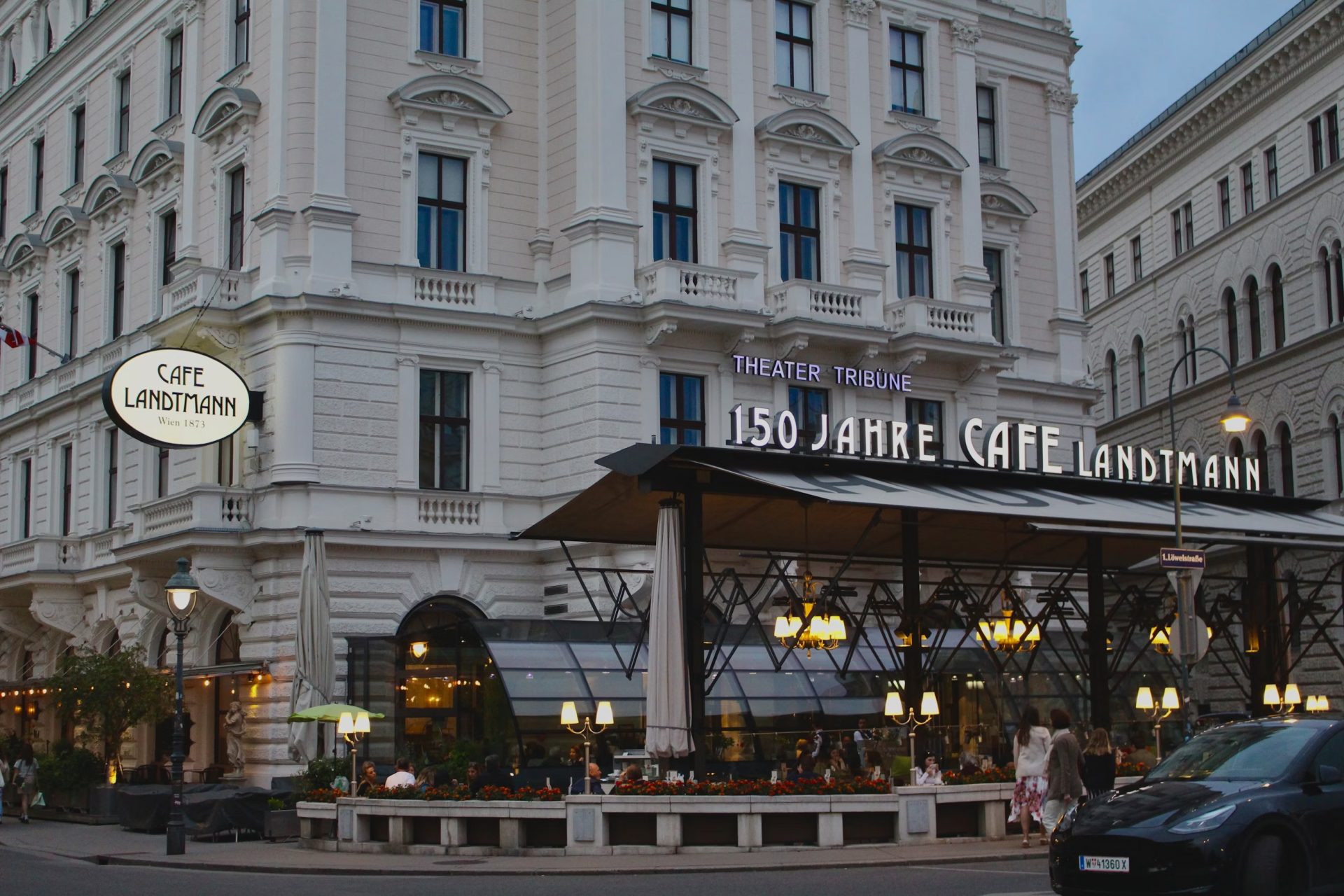Experience Travel Insights
Stirring History: Your Immersive Coffee House Tour in Vienna
by Long Lin-Maurer • September 22, 2025

An Immersive Coffee House Tour in Vienna: A Theatre of the Mind
To step into a traditional Viennese coffeehouse is to do more than simply order a Melange and a slice of Sachertorte. It is to enter a living institution, a sanctuary of thought and a stage upon which the drama of Central European history has been played out for centuries. Recognized by UNESCO as an Intangible Cultural Heritage, the Viennese coffeehouse is not merely a café; it is the city’s public living room, an elegant, time-worn space where the clock seems to tick at a more considered pace. This Vienna coffee house experience is essential to understanding the city’s soul—its intellectual fervor, its creative genius, and its enduring love for the art of living well.
The Viennese Café Journey: From Ottoman Siege to Enlightenment Salon
The story of Vienna’s coffee culture begins, as legend has it, in the spoils of war. After the unsuccessful Ottoman siege of 1683, sacks of strange, dark beans were supposedly discovered and granted to a resourceful Polish-Ukrainian interpreter named Georg Franz Kolschitzky, who opened the city’s first coffeehouse. While the historical accuracy of this tale is debated, the era it represents is not. The arrival of coffee in the late 17th century coincided with the dawn of the Enlightenment, and the new establishments quickly became fertile ground for its ideas.
Unlike the exclusive, aristocratic salons of Paris, the Viennese coffeehouse was a fundamentally more democratic space. For the price of a single cup of coffee, a patron could sit for hours, read an exhaustive selection of local and international newspapers, and engage in debate. Here, status was theoretically left at the door. A civil servant could find himself seated next to an artist, a philosopher next to a merchant. This unique environment fostered a culture of discourse and intellectual exchange—the heart of Viennese coffee culture—that would lay the groundwork for the city’s explosive creative and intellectual blooming in the centuries to come. It was the original crucible of the public sphere, a place where the burgeoning bourgeoisie could shape and share its worldview.
Come and experience travel!
Personally designed, seamlessly delivered – your journey, our expertise!
We are a boutique travel agency and consultancy specializing in Hub & Spoke Tours across Central Europe, the Benelux and the Dolomites.
A Crucible of Modernity: The Fin de Siècle
Nowhere is the coffeehouse’s role more critical than during the *Fin de Siècle*, the twilight of the Habsburg Empire around the turn of the 20th century. Vienna at this time was a glittering, neurotic, and brilliant metropolis, the capital of a vast, multicultural empire teetering on the brink of collapse. The coffeehouse became the laboratory where the modern world was conceived. Within the plush banquettes and beneath the vaulted ceilings of establishments like Café Griensteidl, Café Central, and Café Museum, the very foundations of 20th-century thought were laid.
The literary circle known as *Jung-Wien* (Young Vienna), featuring luminaries like Arthur Schnitzler, Hugo von Hofmannsthal, and Peter Altenberg, practically lived in these spaces. They were not just patrons; they were fixtures, using the coffeehouse as their office, their mail-drop, and their intellectual sparring ground. An in-depth Vienna café exploration of this era reveals how they dissected the psychological complexities of the modern soul, pioneering a literary modernism that mirrored the psychoanalytic revolution happening just a few streets away.
Indeed, Sigmund Freud was a regular at Café Landtmann, and while he may not have formulated his theories over coffee, the environment of intense observation and intellectual cross-pollination was the very air he breathed. The coffeehouse was a microcosm of the city’s psyche—a place of performance, hidden anxieties, and the meticulous study of human behavior. But the conversations were not limited to art and psychology. At Café Central, one might have seen Leon Trotsky playing chess while, at another table, a young, failed artist named Adolf Hitler sketched and fumed. A few years later, Josip Broz Tito and Joseph Stalin were also patrons of Vienna’s cafés. The Viennese coffeehouse was a politically charged, ideologically diverse ecosystem where revolutionary ideas—both utopian and monstrous—were debated, refined, and set on their world-altering courses.
The Anatomy of an Authentic Vienna Coffee Tour
To appreciate the Viennese coffeehouse is to understand its unique rituals and characters. The experience is governed by an unwritten code of conduct, a performance of civility and service that has changed little over the centuries.
Come and experience travel!
We design bespoke travel experiences with a perfect balance of cultural depth, efficiency and comfort.
Specializing in seamless hub-and-spoke journeys, we create well-paced, immersive itineraries tailored to your interests.
The waiter, or *Herr Ober*, is not a mere server but a master of ceremonies. Dressed formally in a tuxedo, he moves with a professional dignity that can seem aloof to the uninitiated but is, in fact, the hallmark of his station. He is a guardian of the institution’s decorum, addressing patrons with formal titles and exhibiting an almost telepathic understanding of their needs.
Your coffee, regardless of the type ordered, will always arrive on a small silver tray, accompanied by a glass of cold, clear Alpine spring water. This is not a simple refreshment. The glass of water is a powerful symbol. It signifies that you are a welcome guest, entitled to linger for as long as you wish. The *Herr Ober* will silently replenish it without being asked, reinforcing your right to occupy this space for contemplation, reading, or quiet conversation.
The interior itself is a key part of the experience. The classic coffeehouse features marble-topped tables perfect for cooling a heated brow, iconic bentwood Thonet chairs that are masterpieces of minimalist design, soaring ceilings with grand chandeliers, and walls lined with newspaper racks holding publications from around the world. It is a space designed to elevate the simple act of drinking coffee into a cultural and aesthetic experience.
A Living Tradition in the 21st Century
Today, the Viennese coffeehouse is no longer the primary engine of intellectual life it once was. The world has changed, and conversations have moved to other forums. Yet, the institution endures, not as a relic, but as a vital part of the city’s contemporary identity. In an age of relentless speed and digital distraction, it offers a powerful antidote: a space dedicated to slowing down.
Come and experience travel!
Our expertise lies in uncovering authentic stories, hidden corners, and behind-the-scenes experiences that bring destinations to life.
We design customized mindful travel experiences that seamlessly integrate mindful eating and mindful indulgence. These experiences foster self-care and create transformational journeys that nurture mental well-being, promote sustainable travel, and strengthen family connections.
It is a place where you can disconnect from the demands of the modern world and reconnect with a more deliberate pace of life. You see businesspeople finalizing deals, students studying for exams, old friends engaged in quiet conversation, and solitary figures simply reading or watching the world go by. The coffeehouse has adapted, embracing its role as a haven of tranquility and a bastion of a cherished cultural ritual.
A truly immersive coffee house tour in Vienna goes far beyond a simple tasting. It is an exploration of history, a lesson in social anthropology, and an exercise in mindfulness. It involves understanding why Café Sperl’s beautifully worn interiors feel like a film set, decoding the intellectual lineage of Café Central’s vaulted ceilings, and appreciating the stark, functionalist modernism that Adolf Loos brought to Café Museum. It is about learning to distinguish between a *Kleiner Brauner* and an *Einspänner* and understanding what your choice of Viennese pastries, like a classic Apfelstrudel, says about the Viennese way of life.
By peeling back the layers of these storied establishments, a visitor moves from being a mere tourist to an engaged observer. You begin to see the city not as a collection of sights, but as a web of stories, ideas, and traditions, all converging on a simple marble-topped table, under the gentle gaze of a *Herr Ober*, with a single, perfect cup of coffee, completing your walk-through of Vienna’s coffee scene.
Immersive Journeys into Viennese Coffee House Culture
- UNESCO Intangible Cultural Heritage: Viennese Coffee House Culture
Explore the official UNESCO listing recognizing Viennese coffee house culture as an Intangible Cultural Heritage, highlighting its profound historical and social significance. - Austrian National Tourist Office: Viennese Coffee House Culture
An overview from Austria’s official tourism portal, detailing the historical evolution and contemporary social dimensions of the Viennese coffee house as a cultural institution. - Austrian National Library Blog: Fin de Siècle Vienna – Cultural Flow at the Coffeehouse
A deep dive into the coffee house as a vibrant hub of cultural and intellectual exchange during Vienna’s pivotal Fin de Siècle era, from a leading cultural institution. - BBC Culture: The Venerable Viennese Coffeehouse Tradition
An article from a reputable international cultural platform exploring the enduring tradition, unique atmosphere, and continued relevance of Vienna’s coffee houses. - Vienna Tourist Board: Viennese Coffee Houses as “Extended Living Rooms”
An introduction to the cultural significance of Viennese coffee houses, portraying them as much more than cafes – rather, as social spaces and intellectual salons. - Vienna Tourist Board: The History of Coffee in Vienna
A historical perspective on how coffee first arrived in Vienna and subsequently evolved into the cherished beverage at the heart of the city’s unique coffee house culture. - Google Arts & Culture (Wien Museum): Vienna’s Coffeehouses – From Intellectual Melting Pots to Tourist Hotspots
An insightful feature combining the resources of Google Arts & Culture and the Wien Museum, presenting the evolution of Viennese coffee houses through time. - Habsburger.net: Intellectual Centres in Vienna around 1900
A historical portal exploring the intellectual landscape of Vienna around 1900, highlighting the pivotal role of coffee houses in shaping artistic and philosophical discourse. - Austrian Information: Viennese Coffeehouse Culture – More Than a Tradition, It’s a Way of Life
An article from the official publication of the Austrian Embassy in Washington D.C., delving into the coffee house as an essential part of Viennese identity and daily life. - Europeana: The Coffee House – A European Institution
An article from Europeana, the European digital cultural heritage platform, highlighting the broader European context of coffee houses with particular reference to Vienna’s influential role and cultural legacy.
